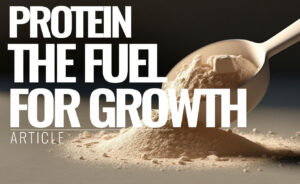
Revive Stronger
5 biological adaptations to fat loss you need to know
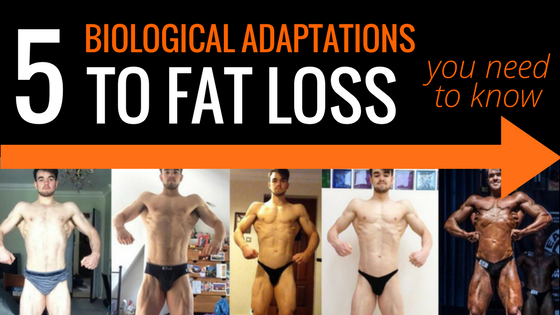
Hunger sucks, it really does.
Being tired sucks too.
Some people like to claim that you don’t need to be hungry on a diet.
Some people claim dieting is easy.
Whilst it sounds nice, and there are some clever things you can do to decrease hunger & low energy, it should be expected on a diet.
Why?
Because our bodies want us to be hungry & move less, so we eat, and do not lose weight.
It’s a survival mechanism.
Plain & simple.
Table of Contents
Adaption
The world is in a constant state of flux, our bodies are the same, they’re dynamic and continually adapting to their environment. When we lift weights our body gets stronger, when we get hot our body cools us down by sweating, just in the same way our body will adapt to the amount of Calories we burn and consume.
For a bodybuilder this is why we must keep progressively overloading our muscles to get them to grow, as an endurance runner this adaption allows them to burn fewer calories when running and for someone dieting this means they have to keep reducing their food intake to keep losing weight.
The body is all about being as efficient as possible.
When we diet there are some things that come down and others up, this is to be expected.
Lots of things change when we diet, but of particular importance are the following.
1.] Leptin
Leptin is something our fat cells produce, in short it tells our brain to stop eating. As we lose fat leptin comes down, and it actually comes down very quickly after entering a calorie deficit. The bigger the caloric deficit and the more fat we lose, but the more this adapts downwards.
In one study leptin was found to drop 54% in the first week of dieting, the drops there after were more gradual [2]. What this means is that leptin levels are very reactive to changes in energy balance, and that by taking breaks (say refeeds/diet breaks) we can help bring them back up.
When we take these periods off from dieting the amount and what we eat is of importance. Stuffing your face with cake probably isn’t ideal, but chowing down on a few extra nuts won’t cut it either. You want carbs, lots of carbs, tonnes of research indicates that it is carbohydrates and not fat or protein that boosts leptin [3]. This is an important consideration when looking to refeed as not only do carbs boost them more, it’s also done faster, if you’re taking a diet break (an extended time off dieting) it becomes less important.
How much do we raise Calories by? You want it to be a break from dieting, so eating at maintenance is a must (multiply whatever you lost in lbs the week prior by 500, or multiple your bw in lbs by 14 to 16) I suggest you keep protein level (which is hopefully ~1g per lean lb) and drop fat almost as low as you can (say around 0.25g per lb) or keep it level and then fill the rest with wonderful carbs.
This is where something like a Primer Phase as depicted below can really help:
Combat Leptin:
- Refeeds (3 days in succession)
- Diet breaks (1+ weeks)
- Full diet breaks (4+ weeks)
There will always be a decrease that is unchangeable because you have lost fat, but the above can help control leptin levels. The more weight you have lost and the larger the caloric deficit, the more time you will need to take for leptin to normalise.
2.] NEAT (Non Exercise Activity Thermogenesis)
I’ve talked about this in great depth before (here), and as we provide our body fewer calories it makes us lazier. We’ve all experience this on a diet; you feel sluggish, you can’t be bothered to go out and see your mates, you take the elevator instead of the stairs at work etc. etc.
The changes can be incredibly small; you no longer sit as upright in your chair at work, you sit between your sets in the gym rather than standing, you lie on the coach for more time in the evening. When you’re in a calorie deficit your physical activity always drops (unless we make a conscious effort to keep it up).
Not everyone responds to the same degree, there are huge differences.
In 1999 Levine et al in the overfeeding study “Role of Non-Exercise Activity Thermogenesis in Resistance to Fat Gain in Humans” he found some quite stark differences between people [1]. Some respond like “children on a sugar high” others just get fatter. Over the course of 8 weeks one person gained only a pound vs. another who gained nearly 10, and this was all put down to their differences NEAT.
Combat NEAT:
3.] Sex hormones
OK so this could be an article in itself, in fact, all of these points could be, but these hormones here are very complex, in large part because men and women are very different.
Just like with cortisol it isn’t that more testosterone and less oestrogen is better, it’s the balance that we’re after and that balance will differ for males and females. Oestrogen and Testosterone both have very important and different roles.
A big reason males are more muscular than females is due to higher testosterone levels, this is because one of it’s key roles is to aid in the production of muscle tissue. A drop in testosterone for both men and women can lead to increased fatigue, low sex drive, decreased fat loss and a loss of muscle mass.
The balance of sex hormones is essential to body composition and ease of fat loss. If you lose your libido or if a female loses her period they are signs that your metabolic health isn’t in a good way. If you set things up right you can avoid these occurring or at least ensure they come back without getting into a lot of trouble.
[bctt tweet=”you know you’re dieting when food porn > real porn” username=”revivestronger”]
Combat sex hormones:
- Resistance training
- Fatigue management (deloads, rest days)
- Diet breaks
4.] Cortisol
First let me state that cortisol gets a bad rap, but as said before, like anything it isn’t bad unless it’s out of balance.
The main way we increase cortisol is stress, whether it be work, training, life, poor sleep or diet. Thus, when we’re in a caloric deficit we cause our body stress, the larger this deficit, the bigger the stress. This is compounded through our training, again the harder you push the more stress that will result, and more cortisol produced.
Thus, it would be smart to avoid excessive calorie deficits and excessive training.
Working hard in the gym is good, but you need to manage your fatigue levels. If you push yourself into a large caloric deficit and spend hours in the gym pounding the weights and treadmills, you’ll find yourself bathing in cortisol.
When cortisol levels become chronically elevated we can see excess water retention which can mask weight loss (as shown here). Also this hormone is catabolic, and if carbohydrate levels are very low it will breakdown protein (muscle) and convert it to glucose (carbs) for fuel (via gluconeogenesis).
There are more reasons to keep your love for carbs high, you see during stressful situations and high intensity training our body wants to use carbs for fuel. Without carbohydrates available we produce more cortisol and breakdown more protein, a big no-no for muscle maintenance.
Combat cortisol:
- Avoid excessive deficits
- Periodise your training intensities
- Take deloads
- Prioritise sleep
- Eat plenty of carbohydrates
Just by taking care of your sleep, eating some carbs around training and not going balls to the wall every gym session you’ll see a huge drop in stress. Remember, it isn’t that cortisol or stress is bad, but that having too much is, and it’s all about trying to keep it in balance.
5.] Ghrelin
This hormone is a dieters nightmare, it causes us to get hungry.
When our ghrelin levels rise our brain says “eat”.
A caloric deficit will cause ghrelin to rise, again this is to be expected, our body doesn’t want us to lose weight. The key is to accept there will be times you’ll feel hungry, and to push through. However, there are some small changes you can make to help you combat this increase in hunger.
Combat Ghrelin:
- Prioritise low-calorie per bite foods (high volume foods)
- Manipulate your meal frequency (fewer, larger meals or Intermittent Fasting)
- Keep protein high (the most satiating macronutrient)
- Ensuring you are well hydrated (so you do not mistake thirst for hunger)
- Caffeine (a powerful appetite suppressant)
- Keep busy (chewing gum can keep your mind and mouth occupied)
- Diet breaks/refeeds
Those are just some of the ways you can help crush hunger, or at least keep it under control.
Practical Implications
These changes are expected and predictable, most cannot be fought, some can. Having an understanding of what happens as we diet is crucial to seeing the body composition changes you want.
Whenever you’re about to start a diet, or are struggling on one, take a look back here. Make sure you’re aware of all the different ways you can combat your bodies attempt to fight fat loss, and take the appropriate action.
Or you can always do what Lyle McDonald says and “suck it up or stay fat”.
[bctt tweet=”suck it up or stay fat – Lyle McDonald” username=”revivestronger”]
What Next?
Join our free facebook group or add us on snapchat (revivestronger) and ask your question there, I will respond asap. Or if you’re after a fresh training programme we have a free 4 week plan using DUP that you can download for free here.
One more thing…
Do you have a friend who would love the above? Share this article with them and let me know what they think.
[bctt tweet=”5 biological adaptations to fat loss you need to know” username=”revivestronger”]
References
- Levine JA et al Role of Non-exercise Activity Thermogenesis in Resistance to Fat Gain in Humans. Science 1999, 283:212-214.
- Relation between circulating leptin concentrations and appetite during a prolonged, moderate energy deficit in women
- Leptin response to carbohydrate or fat meal and associate with subsequent satiety and energy intake
We are a personal coaching service that helps you achieve your goals. We want you to become the best version of yourself.


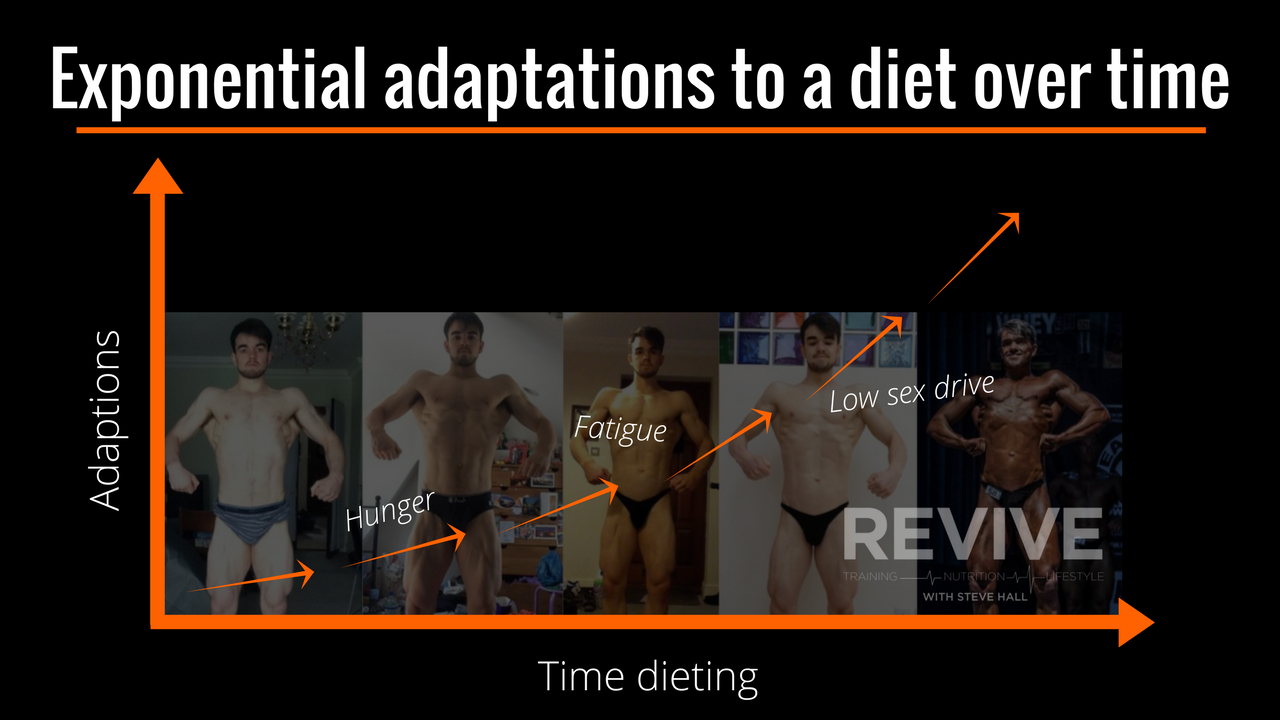
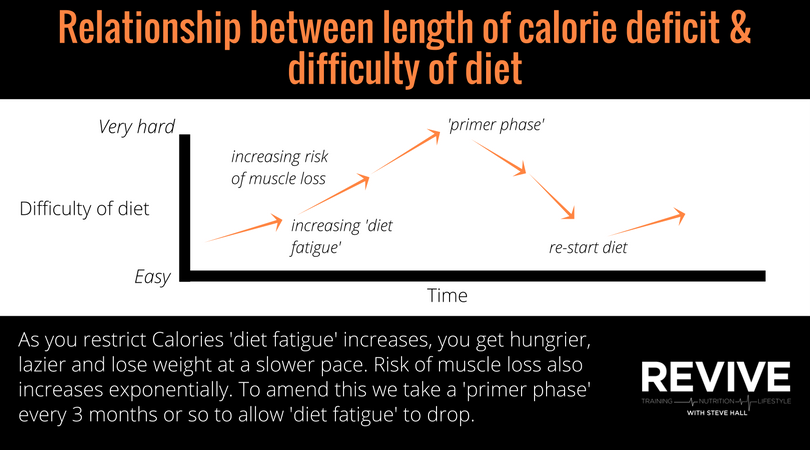
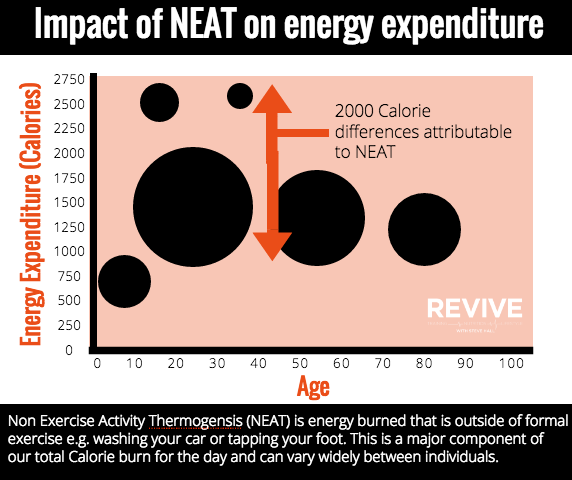
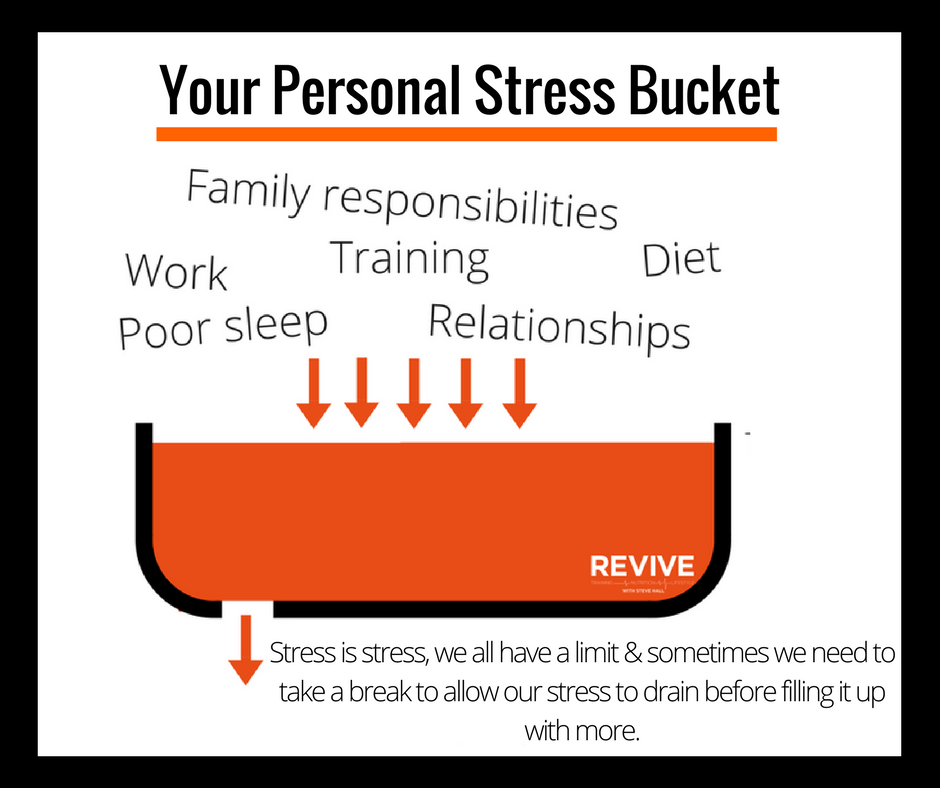




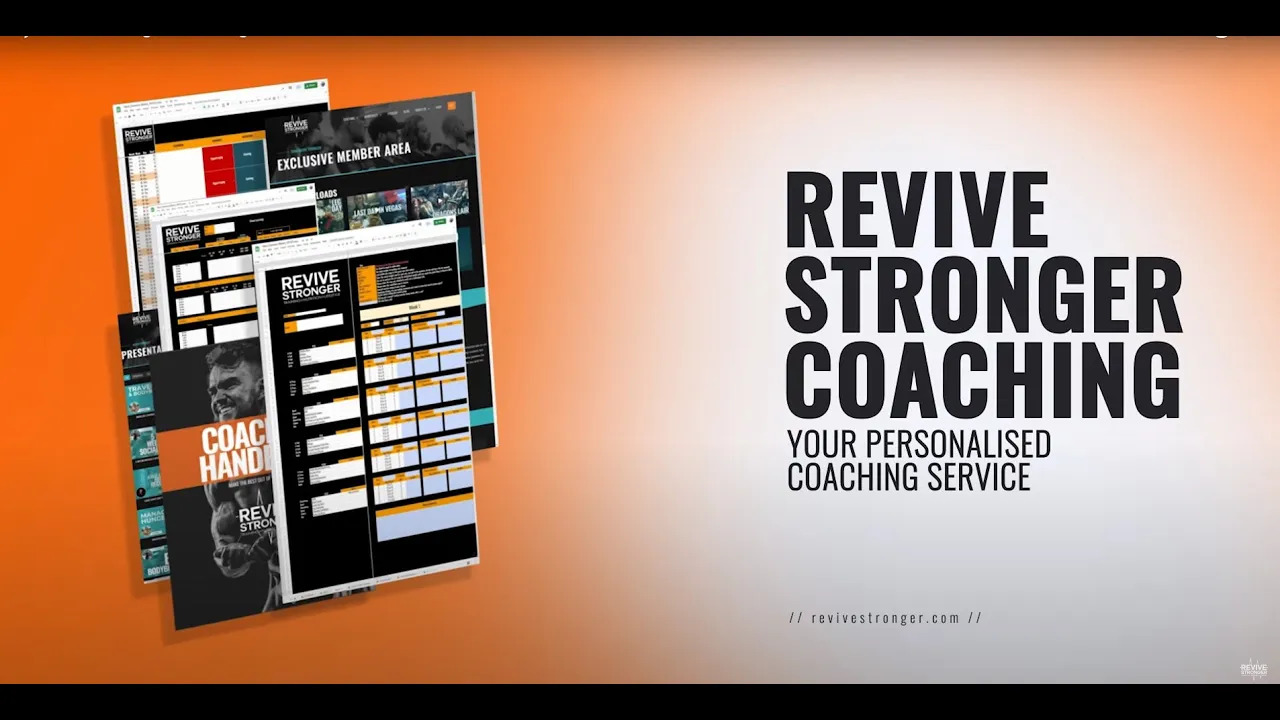
Comments are closed.